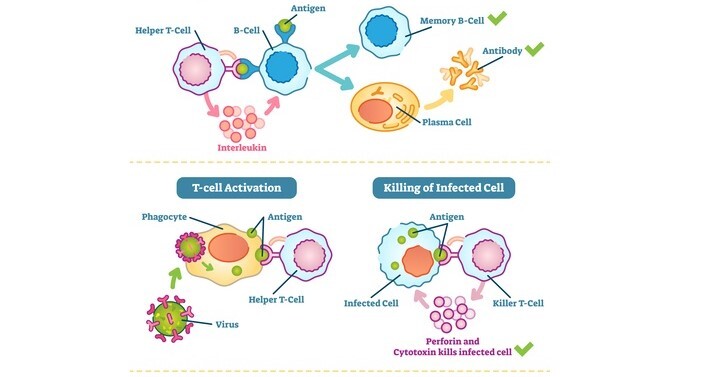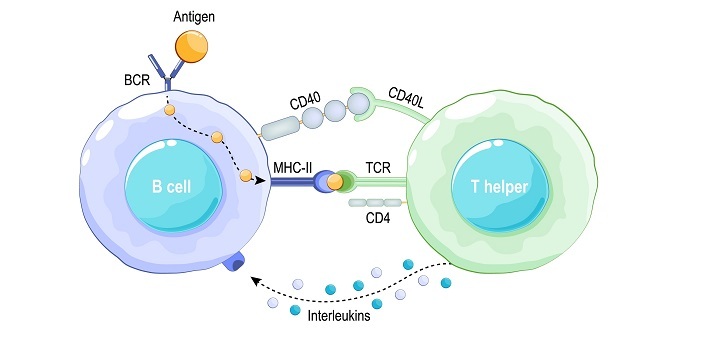
 Data Structure
Data Structure Networking
Networking RDBMS
RDBMS Operating System
Operating System Java
Java MS Excel
MS Excel iOS
iOS HTML
HTML CSS
CSS Android
Android Python
Python C Programming
C Programming C++
C++ C#
C# MongoDB
MongoDB MySQL
MySQL Javascript
Javascript PHP
PHPPhysics
Chemistry
Biology
Mathematics
English
Economics
Psychology
Social Studies
Fashion Studies
Legal Studies
- Selected Reading
- UPSC IAS Exams Notes
- Developer's Best Practices
- Questions and Answers
- Effective Resume Writing
- HR Interview Questions
- Computer Glossary
- Who is Who
Follicular B Helper T Cells and Their Function
Introduction
Within the T cell population, a specific subset known as follicular B helper T cells (Tfh cells) play a crucial role in the formation and function of germinal centers, which are critical for the development of high-affinity antibodies.

The immune system plays a critical role in protecting the body from infectious agents and other harmful pathogens. T cells are an essential component of the immune system and are involved in a wide range of functions, including recognizing, and responding to foreign antigens.
Overview of Tfh cells
Follicular B helper T cells (Tfh cells) are a specialized subset of CD4+ T cells that are found within the germinal centers of secondary lymphoid organs such as lymph nodes and spleen. These cells express high levels of CXCR5, a chemokine receptor that is critical for their migration to B cell follicles.
Tfh cells are also characterized by their expression of the transcription factor Bcl6, which is essential for their differentiation and maintenance. Tfh cells are distinct from other CD4+ T cell subsets such as Th1, Th2, and Th17 cells, which have different functions and express different transcription factors.
Function of Tfh cells
The primary function of Tfh cells is to provide help to B cells in the germinal centre. B cells undergo a process of affinity maturation and class switching in the germinal centre, which allows them to produce high-affinity antibodies that are specific for the pathogen.
Tfh cells provide the necessary signals for this process to occur. And these cells interact with B cells through the expression of a number of molecules, including CD40L, ICOS, and cytokines such as IL-21 and IL-4.

These signals activate B cells and promote their proliferation and differentiation into antibody-secreting plasma cells or memory B cells. Tfh cells also provide critical signals for the selection of high-affinity B cells through a process known as somatic hypermutation.
This process involves the introduction of mutations into the immunoglobulin genes of B cells, which results in the production of antibodies with higher affinity for the pathogen.
Regulation of Tfh cells
The differentiation and maintenance of Tfh cells are tightly regulated by a number of factors, including cytokines, transcription factors, and other signalling molecules.
The cytokine IL-6 is known to promote the differentiation of Tfh cells, while the cytokine IL-2 inhibits their differentiation. Other cytokines such as IL-21 and IL-12 also play a role in the regulation of Tfh cells.
The transcription factor Bcl6 is critical for the differentiation and maintenance of Tfh cells. Bcl6 is induced by the cytokine IL-6 and is essential for the expression of CXCR5 and other molecules that are important for Tfh cell function.
The transcription factors Blimp-1 and Foxp1 are known to inhibit the differentiation of Tfh cells, while the transcription factor IRF4 promotes their differentiation.
Tfh cells are also regulated by other cells within the germinal center, including follicular dendritic cells and regulatory T cells. Follicular dendritic cells provide important signals for the survival and proliferation of B cells, which are critical for the formation of germinal centers.
Regulatory T cells are known to inhibit the differentiation and function of Tfh cells, which helps to prevent the development of autoimmune diseases.
Role of Tfh Cells in Disease
Tfh cells play a critical role in a number of diseases, including infectious diseases, autoimmune diseases, and cancer. In infectious diseases, Tfh cells are important for the generation of protective immunity against the pathogen. However, in some cases, Tfh cells can also contribute to the pathology of the disease.
For example, in chronic viral infections such as HIV and hepatitis C virus, Tfh cells can become exhausted and dysfunctional, leading to impaired antibody responses and persistent infection.
In autoimmune diseases such as systemic lupus erythematosus (SLE), Tfh cells have been shown to be dysregulated, leading to the production of autoantibodies and the development of autoimmunity. In SLE, Tfh cells have been found to express high levels of the transcription factor Bcl-6 and produce high levels of IL-21, which promotes the differentiation of autoreactive B cells.
Tfh cells have also been implicated in the development of cancer. In some types of cancer, such as follicular lymphoma, Tfh cells are present in high numbers within the tumor microenvironment and are thought to promote tumor growth and survival.
In other types of cancer, such as melanoma, Tfh cells have been shown to be important for the generation of antitumor immunity.
Therapeutic Targeting of Tfh Cells
Given the critical role of Tfh cells in a number of diseases, there is increasing interest in developing therapies that target these cells.
One approach is to target the cytokines and signalling pathways that regulate Tfh cell differentiation and function.
For example, inhibitors of IL-6 signaling are currently being developed for the treatment of autoimmune diseases such as rheumatoid arthritis.
Another approach is to target the interaction between Tfh cells and B cells. One strategy is to use monoclonal antibodies that target CD40L, which is critical for the interaction between Tfh cells and B cells.
These antibodies have shown promise in preclinical models of autoimmune diseases and transplant rejection.
Conclusion
Follicular B helper T cells are a specialized subset of CD4+ T cells that play a critical role in the formation and function of germinal centers. Tfh cells provide critical signals for the proliferation, differentiation, and selection of B cells in the germinal center, which allows for the development of high-affinity antibodies.
The differentiation and maintenance of Tfh cells are tightly regulated by cytokines, transcription factors, and other signaling molecules. Dysregulation of Tfh cells has been implicated in a number of diseases, including infectious diseases, autoimmune diseases, and cancer. Developing therapies that target Tfh cells represents an exciting area of research that has the potential to lead to new treatments for a wide range of diseases

